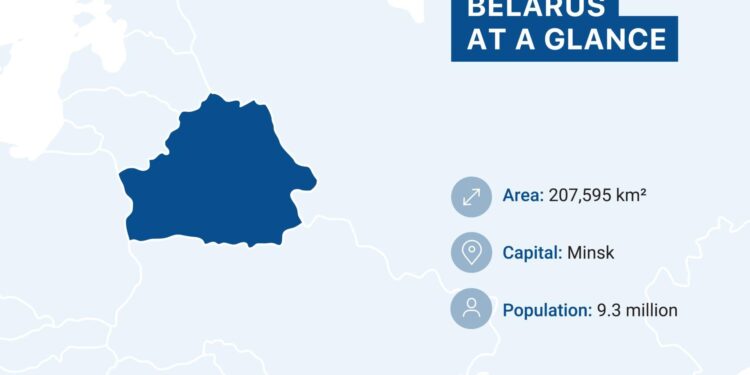Belarus and Russia’s Samara Oblast are taking significant steps to enhance their economic collaboration through the establishment of a joint commodity exchange, according to reports from BelTA News Agency. This initiative aims to streamline trade, boost regional market integration, and strengthen bilateral ties amid shifting geopolitical and economic landscapes. The move signals a strategic effort by both parties to capitalize on their complementary resources and logistical advantages, fostering closer cooperation in the Eurasian economic space.
Belarus and Russia’s Samara Oblast Enhance Economic Ties Through Commodity Exchange
Officials from Belarus and Russia’s Samara Oblast have embarked on a strategic initiative to fortify bilateral economic relations by boosting commodity exchange. The two regions are fostering partnerships aimed at increasing trade volumes, streamlining logistics, and diversifying exchanged goods to benefit manufacturers, farmers, and consumers alike. Key sectors targeted include agriculture, machinery, petrochemicals, and consumer goods, with both sides expressing commitment to enhancing mutual market access and removing existing trade barriers.
To support these objectives, joint working groups have outlined concrete measures, such as:
- Developing cross-regional supply chains that optimize transportation and reduce delivery times
- Facilitating joint ventures and investment projects to boost industrial capacity
- Creating a digital platform for real-time commodity exchange data and trade facilitation
| Commodity | Belarus Exports | Samara Oblast Exports |
|---|---|---|
| Potatoes and Vegetables | 45% | 5% |
| Machinery Components | 15% | 40% |
| Petrochemicals | 10% | 30% |
| Consumer Goods | 30% | 25% |
Authorities emphasized the potential for this enhanced cooperation to stimulate regional development, increase employment, and solidify economic stability amid challenging global conditions. Both Belarus and Samara Oblast remain focused on expanding trade beyond volumes to include knowledge exchange and sustainable practices, setting a robust foundation for long-term partnership in the Eurasian economic landscape.
Strategic Benefits and Challenges of Regional Cooperation in Trade and Industry
Closer economic ties between Belarus and Russia’s Samara Oblast represent a strategic maneuver to harness mutual strengths in commodity exchange, bolstering market access and fostering economic resilience. Through coordinated industrial efforts, both regions stand to accelerate innovation, reduce trade barriers, and optimize supply chains. Key advantages include:
- Enhanced resource allocation and diversification of export markets.
- Improved competitive positioning on the global stage.
- Increased opportunities for joint ventures and technology sharing.
- Stronger political and economic ties promoting regional stability.
However, this collaboration is not without its complexities. Navigating differing regulatory frameworks, aligning quality standards, and managing logistical bottlenecks present notable challenges. Additionally, reliance on commodity exchange introduces volatility risks, demanding robust contingency planning. The success of this cooperation hinges on effective governance, transparent communication, and adaptive policy-making to mitigate potential friction points.
| Benefit | Challenge |
|---|---|
| Market expansion opportunities | Regulatory alignment complexities |
| Joint technology development | Logistical coordination issues |
| Economic diversification | Commodity price fluctuations |
| Political-economic ties | Communication barriers |
Policy Recommendations to Strengthen Bilateral Commodity Markets and Foster Sustainable Growth
To solidify and expand the commodity exchange between Belarus and Russia’s Samara Oblast, authorities should prioritize the implementation of transparent regulatory frameworks that facilitate smoother trade flows. Establishing clear, standardized procedures for commodity certification and quality control will reduce disputes and enhance trust among market participants. Additionally, encouraging public-private partnerships can infuse the bilateral commodity markets with innovative technologies, fostering efficient supply chain management and real-time data exchange.
Key measures to consider include:
- Harmonizing customs and tariff regulations to minimize delays and costs.
- Institutionalizing dispute resolution mechanisms for quicker conflict mitigation.
- Investing in digital infrastructure to support blockchain-based transaction tracking.
- Promoting joint research initiatives related to sustainable commodity production.
| Policy Area | Proposed Action | Expected Outcome |
|---|---|---|
| Regulatory Alignment | Unified standards for export-import procedures | Reduced administrative barriers |
| Technological Investment | Deployment of blockchain for commodity tracking | Increased transparency and efficiency |
| Sustainability | Incentives for eco-friendly production practices | Long-term market stability and growth |
In Summary
As Belarus and Russia’s Samara Oblast move forward in enhancing their commodity exchange collaboration, both parties signal a commitment to deepening economic ties amid a shifting geopolitical landscape. This partnership not only aims to streamline trade and boost regional development but also reflects broader efforts to strengthen integration within the Eurasian space. Observers will be watching closely to see how these initiatives unfold and impact the economic trajectory of the two regions in the months ahead.
















